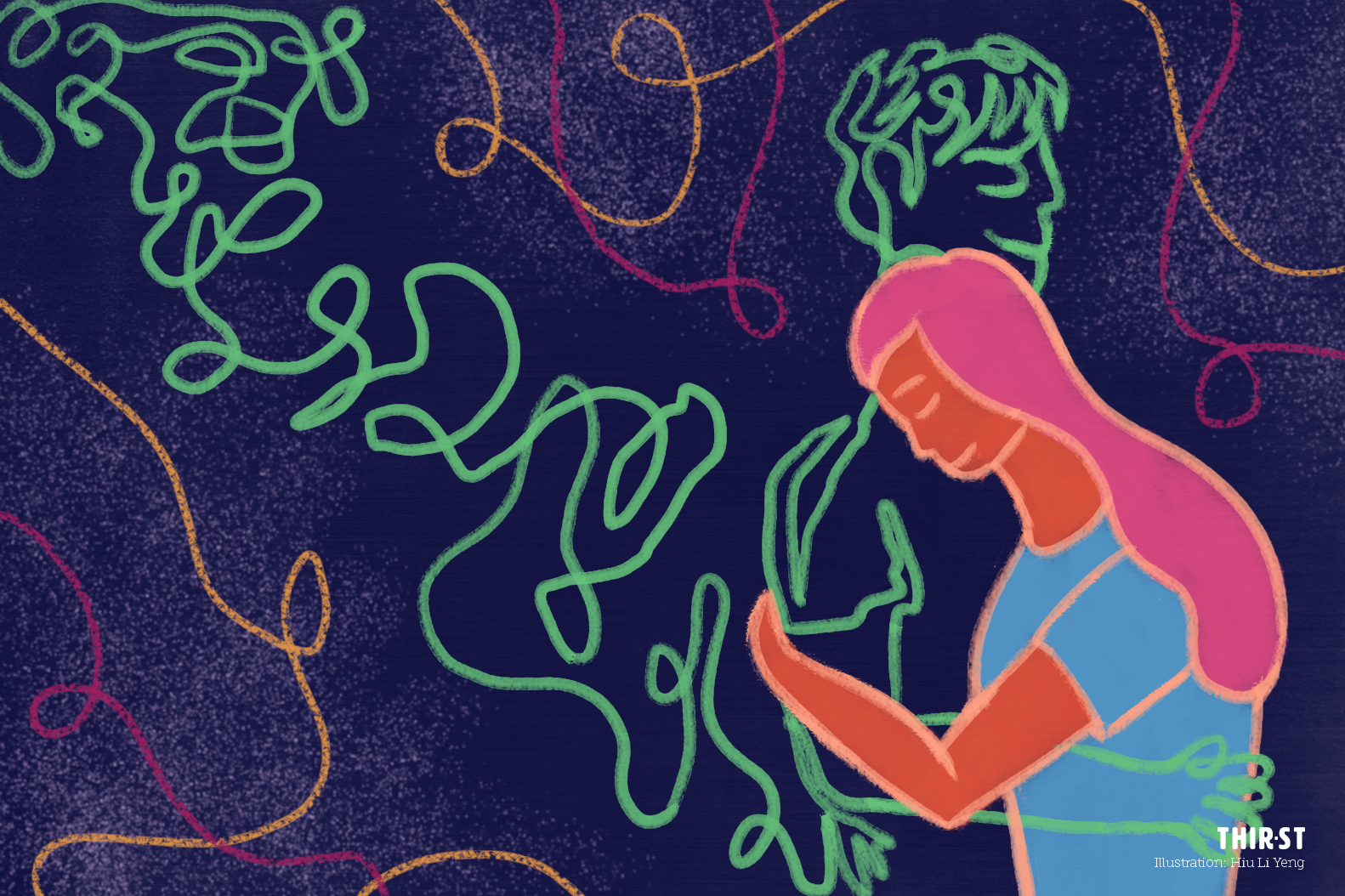For most of my life, I struggled greatly with forgiving and loving my parents. I couldn’t reconcile how as Christians, things were constantly stormy on the home front.
Confused and disappointed by them, I concluded that authority figures were hypocritical – harsh when no one was looking but affectionate in front of others.
The grudges in my heart towards my family ran deep, and often I wondered why it was even necessary to forgive them when I was the one who was hurt to begin with.
Bearing bitterness felt like a right, almost as though unforgiveness was justified. Revenge felt like entitlement and it seemed reasonable to expect justification on my own terms.
It feels so natural to hate on those who hurt you.
Instinctive as it felt, hate became an increasingly heavy burden to bear. A part of me wished I didn’t have to deal with those negative emotions every time they were triggered. But the option of forgiving my parents seemed to be even more daunting.
Back then, forgiveness was a foreign concept to me, and I perceived it as a sign of weakness. I thought that forgiving someone meant letting them off the hook and questioned how anyone could let someone off so easily when they had been the cause of your pain.
Things only started to change when the mental lethargy overshadowed the rage in my heart. Behind every hard-hearted individual is a soul trying to find rest and peace. That was what I needed deeply, but was doubtful that anyone could ever meet this need that ran way back into the past.
STARTING FROM REST
It wasn’t until I read Matthew 11:28-30 that I realised how Christ promises to give rest to those who come to Him. It doesn’t matter how deep the hurt goes, it doesn’t matter how long you’ve tried to get over your wounds, Jesus promises rest for your soul when you decide to come to Him.
The verse continues to say: “Take my yoke upon you and learn from me, for I am gentle and humble in heart, and you will find rest for your souls.”
Learning from God is a continuous process, but He reassures that our souls can rest when:
- We come to Him.
- We take His yoke and surrender our burdens.
- We learn from Him.
This promise of having rest didn’t solve my root problem of unforgiveness though. There was still a war to be fought, but finding rest and refuge was the first step towards winning the battle against unforgiveness.
ACKNOWLEDGING THE PAIN
The next step was to address the hurts I felt. Jesus didn’t merely brush my wounds off with trivial statements like “get over it already”.
Instead, He led me to Hebrews 4:15, which states that “we do not have a high priest who is unable to empathise with our weaknesses, but we have one who has been tempted in every way, just as we are – yet He did not sin.” This high priest is Jesus.
Jesus didn’t offer the hurting mere sympathy. The Scripture says that He empathises with us because He’s been through and encountered the same fallenness of the world. The only difference was He remained pure and without the stain of sin.
“God made him who had no sin to be sin for us, so that in him we might become the righteousness of God.” (2 Corinthians 5:21)
Through passages like these, I came to understand that Jesus doesn’t take our wounds lightly. He has encountered the same pain, fear, anger, hatred, confusion and feelings of injustice as we have; He’s felt every ounce of it and doesn’t belittle whatever we’re feeling.

John 11:35 says “Jesus wept.” It’s a short verse, but it speaks volumes. This passage talked about how Mary and Martha were weeping over their dead brother, Lazarus, and how Jesus wept with them.
Jesus has encountered the same pain, fear, anger, hatred, confusion and feelings of injustice as we have and doesn’t belittle whatever we’re feeling.
Instead of offering consolations or trying to make things “better” in the immediate moment, all Jesus did was offer His companionship and wept alongside them.
Sometimes, the best remedy for hurts isn’t talking someone out of it, but by just being there in silence, weeping with them. This can be comfort in itself. And that’s what Jesus did for my wounds.
Instead of telling me to “forgive and forget”, “move on” or “stop living in your past”, He directed me to Bible passages and showed me that He mourned with me and that I was never truly alone (Hebrews 13:5, Deuteronomy 31:6). He showed me Psalm 34:18: “The Lord is close to the brokenhearted and saves those who are crushed in spirit.”
I’ve never met someone who was this sensitive and patient with my wounds. Even I got impatient with myself, but Christ showed that He was in no hurry and that He wanted to give me all the time I needed to fully process, express and release my hurts to Him.
When you’ve been coping with wounds the same old ways, by suppressing them, brushing them aside or compartmentalising them, having someone take the time to sit with you and ask about what you truly feel, then listen to all of it in detail on repeat, means a lot.
We feel the need to take things, like revenge, into our own hands because we assume that no one else is truly able to understand the depth of our hurts and fix what was done against us.
There’s that sense of loneliness when it feels like no one is one your side. Even if they are, there’s nothing they can do to change things, which leads us to want to change things ourselves.
Behind all the anger, hatred and bitterness was brokenness and hurt that had no closure. And Jesus was the only one patient enough to walk me through this process without showing any sign of restlessness or frustration at my seemingly slow process of grieving.
There was still unforgiveness to deal with, but learning these things was the next step towards overcoming unforgiveness:
- God promises my soul rest when I came to Him.
- I am never truly alone in my hurts because He empathises with me.
- God grieves with me.

Finally, over time, the verse Romans 12:19 came into mind. Here, God very clearly told me that I should leave avenging up to Him because He’s a God of justice and will repay. I struggled greatly with letting God take control because it’s always easier to believe that you know better.
TRUSTING GOD KNOWS BETTER
Ultimately, the question wasn’t so much about repaying those who’d hurt me and more about not trusting God to be just in repaying injustice.
A part of me believed that if He really loved me, He wouldn’t have allowed all those horrible things to happen to me as a child. But the fact that they did happen, how was I to know that He is indeed capable of justifying and fixing the mess that I’ve become part of?
These were questions that God already knew of (Psalm 139:4), and much as I was upset with Him, I prayed that He would help my unbelief (Matthew 9: 23-25).
It’s not that I didn’t want to trust in God – because of all that happened, I didn’t know how to even start trusting Him. But I made the choice to nonetheless believe that if He’s God, His ways are higher than mine, even if it may not always appear so (Isaiah 55:8-9).
By constantly fixing my eyes on God and reading Scripture to understand His character, I came to understand that He’s a God of love and forgiveness (1 John 1:9).
And if God is loving and forgiving, and had forgiven me for the times I intentionally walked away from Him or didn’t even feel sorry for deliberately sinning, who am I to be bitter about things when I’m no better either?
When confronted with the truth, I knew that I had to forgive those who had hurt me in my life, even if they were unapologetic about it.
To be fair, my parents have done a brilliant job in forgiving me for my mistakes too. In fact, I think they gave me more grace compared to anyone else, and I would even say that their forgiveness inspired me to be forgiving.
I hurt them a lot growing up, and seeing how they forgave me so readily, as part of God renewing their heart and mind, motivated me to forgive them as well for their mistakes.
We all fall short of God’s glory (Romans 3:23), and I saw that comparing the severity of sins didn’t matter as much as the fact that all of us, are sinners to begin with (Ephesians 2:1-10) and deserved death (Romans 6:23).
But instead of giving us what we deserved (Psalm 103:10) – eternal separation from God – Christ chose to forgive us at the expense of His life (Romans 5:8). When confronted with this truth, I knew that I had to forgive those who had hurt me in my life, even if they were unapologetic about it (Luke 6:32-36).
It’s easy to love the lovable, but it takes true strength to love and forgive those who are less likeable. It’s hard to extend the same mercy you’ve received to others when we think they don’t deserve it.
But it’s not for us to decide whether they should be forgiven only when they’re deserving. The only thing we’re asked to be faithful to is forgiving those who have wronged us.
That was an extremely humbling lesson I had to learn, and over time I came to realise that forgiving someone isn’t a one-off decision. It’s continuously choosing to give grace whenever you’re triggered. Just like how God continuously forgives us when we confess our sins to Him (1 John 1:9), the same goes with us forgiving others.
“Then Peter came to Jesus and asked, ‘Lord, how many times shall I forgive my brother or sister who sins against me? Up to seven times?’ Jesus answered, ‘I tell you, not seven times, but seventy-seven times.'” (Matthew 18:21-22)
BEING FAITHFUL TO FORGIVE
Till this day, I’m constantly making the choice to forgive grievances.
It’s very challenging. Triggers are always out to evoke negative emotions, but instead of arguing my way through, I try to remember that Jesus doesn’t want me to be enslaved to these negative emotions, and He paid a precious price to set me free.
The world we live in is a broken and inverted one, and because we’re all sinners there’s always going to be a struggle between our flesh and the Spirit (Galations 5:17-26). But Jesus promises that in spite of all these struggles, He has already overcome the world (John 16:33) and redeemed us (2 Corinthians 5:17).
Whatever negativity you’re going through, Jesus has already decided that the final fate of every tragedy, abuse, hurt and evil will be overturned eternally by His love and righteousness (Revelation 21:4).
“He will wipe every tear from their eyes. There will be no more death or mourning or crying or pain, for the old order of things has passed away.” (Revelation 21:4)
Forgiving someone may feel like you’re putting yourself at a disadvantage; it may even feel painful. But by choosing to see that we’re not fighting against flesh and blood but against principalities and powers of a dark kingdom (Ephesians 6:12), we learn how to love people for who they are and see that their sin is independent of their value as a person created after God’s image (Genesis 1:27).
- Are there areas of unforgiveness in your life?
- Why do those areas persist? How has the Holy Spirit convicted you?
- How can you take the first step to forgive and let go?
- Why is it important for us to keep forgiving?









